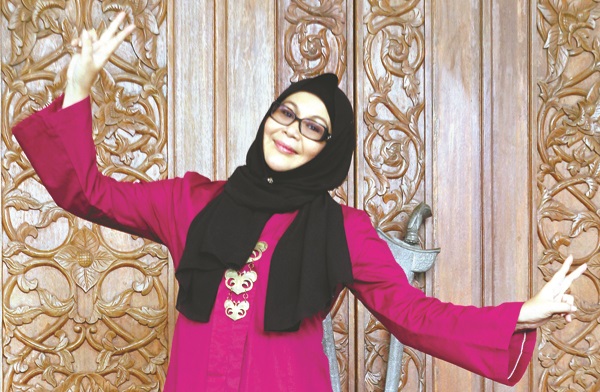EVEN before the curtains raised on Erma Fatima’s Pawana Isabella last Wednesday night at Istana Budaya, Kuala Lumpur, the 51-year-old director had to face a number of brickbats, as well as fend off speculation over her latest theatre production, which she also wrote.
The play, which runs till Aug 31, tells the story of how a good king named Raja Pawana is unappreciated by his people, until their land is conquered by Raja Barouk and his power-crazy queen, Permaisuri Tishaku.
Raja Pawana is then imprisoned, and it is up to his queen, Permaisuri Isabella, to unite the people and start a revolution to rescue the king and throw the usurper out of their country.
Erma has brought together a cast of 80 talented artistes for this production, but she drew some criticism for casting a number of ‘non-theatre personalities’, such as popular television star Syafiq Kyle and actress-model Azar Azmi, in her play.
She was fiercely criticised for this decision, especially regarding her choice of hiring Syafiq, who has no theatre experience to speak of, to play the lead role of Raja Pawana.
Erma defended her decision by stating that it is part of a marketing strategy to get people to watch the play.
“It is important [for me] to have commercial names in my production to pull in the crowd,” she said.
“Most Malaysians are not theatre lovers. [But they might] come to see the play because he [Syafiq] is in it.”
However, Erma added she is hoping these people might become impressed with other aspects of the production and learn to love the theatre.
As for Syafiq’s lack of theatre experience, she said he has made good progress and believes he will win over the critics.
“In the past, I have cast film actors like Remy Ishak, Aaron Aziz and Erra Fazira in my theatre productions,” she said, adding that though they had no theatre experience initially, they managed to do well on stage.
The plot of Pawana Isabella also gave rise to speculation that the characters in the play are in fact a representation of certain Malaysian leaders and their wives.
Raja Pawana is said to be a combination of Tun Dr Mahathir Mohamad and Datuk Seri Anwar Ibrahim, while Permaisuri Isabella (played by actress-singer Janna Nick) is supposed to represent Anwar’s wife Datuk Seri Dr Wan Azizah Wan Ismail, while Queen Tishaku (Azar) is alluded to be Datin Seri Rosmah Mansor, and her timid husband, Raja Barouk (played by actor-comedian-director Afdlin Shauki), is said to be a representation of Datuk Seri Najib Razak.
Erma insisted that there is no Rosmah, Najib, Mahathir, Wan Azizah, or Anwar in her play. “My inspiration to write the play did not come from any political leaders or their wives.”
But she admits that she is critical about her own race and their follies.
“The Malays are no longer united,” she said. “Politics have divided them. When a race is divided, you are never strong. We should stand united no matter what our own political beliefs are.”
She also pointed out that the Malays are quick to dissect the weaknesses of their leaders but do not see the weaknesses in themselves, adding that “it is always so easy to point fingers at others”.
Erma is expecting to receive some backlash from this piece of work.
She said: “It has become sinful for us to talk about our own race in this country.
Some will accused me of putting down my own race by portraying them as greedy, ungrateful and stupid. But I am just speaking from my observations. I am worried about the future of my race.
“I want my audience to leave the theatre hall, thinking about what kind of future they want for their children and their grandchildren. They should think about the next generation.”
Erma added that her play might not be to everyone’s taste as her story is a little too heavy for most Malaysians to digest and enjoy.
“Malaysian audiences love stories that are more entertainment-based,” she said. “They do not like stories that make them think.
“They like simple love stories where the parents are obstacles to the hero’s love story or where the heroine has to face a bad mother-in-law. So when they have to [digest] something different from what they have been usually served, they would not like it.”
As for presenting the play from two women’s perspective, Erma said: “You must never underestimate the power of a woman. She has the power to shake the world.”














